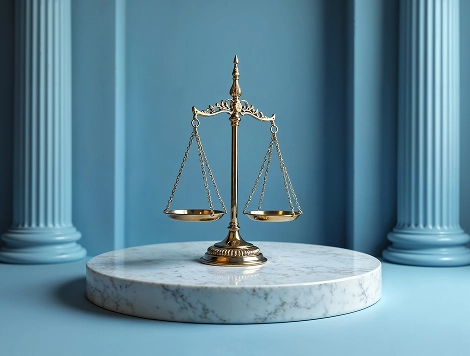
Governance and Compliance
Importance and Mission

Saksiam Leasing Public Company Limited recognizes the importance of good corporate governance and regulatory compliance at all levels of its operations. The company is committed to building a transparent, auditable, and internationally aligned operating system to foster trust and confidence among all stakeholder groups. A strong governance framework not only mitigates the risk of errors or misconduct but also serves as a fundamental pillar for the company’s long-term sustainable growth.
With a mission rooted in governance and compliance, the company fosters a corporate culture that emphasizes integrity, ethics, and social responsibility. It is firmly committed to strict adherence to laws, regulations, and relevant standards, while also promoting employee awareness and understanding of their roles and responsibilities. Additionally, the company continuously develops and improves its processes to keep pace with evolving legal requirements and the changing business environment.
Supporting the SDGs Goals
Goal 10:

Goal 16:

Goal and Performance
Goal
Performance
Goals
Performance
Goals
Performance
Management Approach
The company focuses on operating correctly, transparently, and preventing legal hazards.
There are specific instructions to ensure that the organization can effectively comply with relevant laws and regulations, such as assigning an individual to collect relevant laws, investigate compliance requirements, and communicate with operators, including checking their understanding. When a regulatory agency comes to inspect, the company develops a plan to improve in order to comply with the requirements. The operations are as follows:
Conflict of Interest
The company has a policy to prevent conflicts of interest in order to maximize the benefits to the company and its shareholders. This policy is divided into 2 parts: related transactions and other situations that may lead to conflicts of interest.

Internal Audit and Control
The audit committee has carried out its duties with fairness and independence in order to add value to the organization, improve the operation of internal control supervision, risk management, and the management supervision process, which encompasses all aspects, including accounting, finance, compliance with laws, regulations, and any associated rules, and to establish an effective check and balance process. There is an internal audit unit in charge of inspecting the performance of all lines of work in accordance with the audit plan, which prioritizes the organization's risks, as well as providing advice on such matters to help the organization achieve its goals.
The audit committee reviewed the audit plan, controlled and supervised the internal audit unit's performance to ensure independence, performed auditing and balancing duties in accordance with the specified standards, and reported directly to the audit committee at least once per quarter to ensure the adequacy of the internal control system and efficient and thorough internal audit, which assists in minimizing the possibility of damage to the company's operations.
In 2024, the audit committee and board of directors approved that the company's internal control system was adequate and effective.

Supervision of Subsidiaries and Associates Company
The company prioritizes the supervision of subsidiaries and associated companies and focuses on developing strategies that ultimately result in a good governance system for subsidiaries and associated companies in accordance with relevant criteria outlined in the Stock Exchange of Thailand and the Securities and Exchange Commission's good corporate governance guidelines, including taking into account all stakeholders' rights and benefits in accordance with the investment policy and supervision of operations. The company and its subsidiaries have joint operational guidelines for policies, performance reporting, supervision, risk management, compliance with laws and regulations, related party transactions, and communication.
As the result, the subsidiaries have fulfilled all of the policy's criteria in 2024.

Tax Transparency
The company manages taxes appropriately, pays taxes to local governments on time, and discloses complete and accurate tax information, along with the actual tax rates paid, to promote confidence and comprehension among stakeholders as follows:
| Financial Statements | 2021 | 2022 | 2023 | 2024 |
|---|---|---|---|---|
| Profit Before Income Tax | 758,332,875 | 887,996,299 | 936,438,943 | 1,049,205,680 |
| Value Added Tax (VAT) | - | 4,134,820 | 12,792,390 | 12,844,548 |
| Corporate Tax | 150,876,081 | 179,381,873 | 187,664,415 | 212,388,447 |
| Stamp Duty | 10,134,188 | 12,042,622 | 13,357,013 | 14,960,357 |
| Special Business Tax | 55,676,302 | 70,487,187 | 81,861,579 | 93,500,654 |
| Withholding Tax | 162,020,977 | 198,486,788 | 193,999,488 | 226,866,688 |
| Effective Tax Rate | 21.37% | 22.35% | 20.72% | 21.62% |
Whistleblowing and Complaints
The Whistleblowing Policy specifies channels and processes for reporting information or complaints, and it operates as an accountability system to monitor misconduct in accordance with the code of conduct, thereby increasing operational transparency and customer confidence. According to the policies and guidelines for preventing and combating corruption, employee misconduct, human rights violations, illegal acts, behaviors that may lead to corruption, and deficiencies in the internal control system, non-compliance with the code of conduct and business ethics, the strict anti-corruption measures have been established, which includes measures to prevent and detect irregularities or corruption in a timely manner. Employees can use these measures as a channel to file complaints or suggestions. Additionally, there is a mechanism in place to protect whistleblowers in accordance with the guidelines for accepting complaints, which take into account the scope of complaints and the channels for accepting complaints.
1. Receiving and recording complaints
2. Considering the credibility of the complaints
3. Investigating facts and collect evidence
4. Taking corrective action and disciplinary measures
5. Protecting the complainant and maintain confidentiality
6. Following up and issue preventive measures to prevent the recurrence of problems
In 2024, the internal audit department received 6 complaints, five of which were resolved and 1 of which is currently being investigated for facts.
